Defense & Security Archive
Free Newsletter
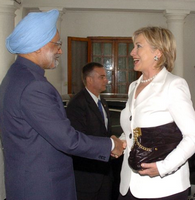
NEW DELHI — U.S. Secretary of State Hillary Clinton was in India yesterday for the second strategic dialogue between the two countries. The meeting’s agenda was dominated by the need to strengthen strategic counterterrorism and defense cooperation, iron out wrinkles over nuclear cooperation and adapt to the tectonic shift in the geopolitics of the Afghanistan-Pakistan region. The bilateral strategic dialogue was put into motion during Indian Foreign Minister S.M. Krishna’s visit to Washington in March. Though there was nothing to rival the high-adrenaline excitement surrounding the 2008 Indo-U.S. nuclear deal or the histrionics that characterized U.S. President Barack Obama’s November […]
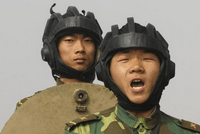
Depending on your perspective, the original “Red Dawn,” released in 1984, was either a coming-of-age milestone or a crime against the medium of cinema. The movie pitted a high school football team in rural Colorado against the better part of a Soviet airborne brigade, the former led by Patrick Swayze and the latter led, for some reason, by a Cuban colonel. Not surprisingly for an American film, the Americans do quite well, although they are eventually overwhelmed by the firepower of Soviet helicopter gunships. Later this year, a remake of “Red Dawn” will hit the screens in the United States. […]
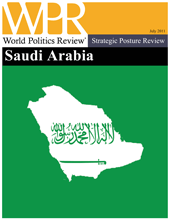
As the Middle East undergoes historic changes, Saudi Arabia continues to gradually shift its foreign and defense policies to reflect both new realities in its region and changes in the global landscape. The two main components of this shift include an ongoing effort to deter Iran and enhance stability among its regional allies through a sizable buildup of its conventional military forces, including a proposed record $90 billion arms sale from the United States, and a broadening of its economic and political ties with emerging global powers such as China and India. Ties between Saudi Arabia and its longtime backer […]
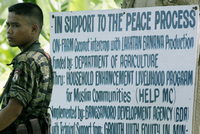
One year after taking office in July 2010, Philippine President Benigno Aquino’s effort to end the country’s decades-long internal conflicts is still stuck in first gear. Aquino has put the highest premium on reaching a political settlement with the Muslim Moro Islamic Liberation Front (MILF) and making inroads with the Maoist front led by the Communist Party of the Philippines (CPP) — while not forgetting the Moro National Liberation Front (MNLF), another Muslim rebel group that signed a final, yet shaky, peace agreement in 1996. In fairness, Aquino has made progress. But doubts remain about whether the steps he has […]
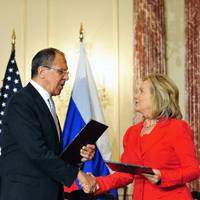
One sign of how good relations between Russia and the United States have become is that Russian Foreign Minister Sergey Lavrov spent three days in high-level meetings in Washington without attracting much attention from the American news media. Bilateral ties may finally be evolving, at least for now, into a more mature, almost normal relationship between two great powers sharing common interests as well as limited areas of disagreement. Lavrov discussed a range of important issues with his American interlocutors, including Libya, Syria, Iran, Korea, Afghanistan, South Sudan, terrorism, the Israel-Palestine peace process, the United Nations and even Alaska and […]
I had the pleasure of participating in France 24’s panel discussion program, The World This Week, last Friday. The other panelists were Paris Match’s Régis Le Sommelier, France 24’s Annette Young and Global Post’s Mildrade Cherfils. Topics included the News of the World scandal, the U.S. and European debt crises, and the Libya war. Part one can be seen here. Part two can be seen here.

Americans today are enjoying the most peaceful period, on a per capita basis, in human history, with virtually all of the remaining mass violence in the system occurring not between organized militaries, but rather sub- and transnationally — that is, within nation-states and across their borders. The frequency, length and lethality of conflicts are all down from Cold War highs, despite the growth in both numbers of countries and world population. Nonetheless, most Americans continue to have extremely misdirected fears and impressions regarding the global security landscape. We see a world of wars and believe them all to be of […]
In late-June, the U.N. Security Council renewed the mandate of the peacekeeping mission in the Democratic Republic of the Congo (DRC), despite calls by DRC leaders for its withdrawal and fierce criticism of the mission’s failure to halt the country’s rape crisis. In an email interview, Theodore Trefon, senior researcher at the Royal Museum of Central Africa in Belgium and author of the forthcoming book “Congo Masquerade,” discussed the U.N.’s peacekeeping mission in the DRC. WPR: What are the main challenges facing the U.N. in the DRC? Theodore Trefon: Powerlessness is the word that best captures the challenges facing the […]
Remarks this week by U.S. President Barack Obama may have indicated a hardening of his administration’s posture against Syrian President Bashar Assad and Syria’s ongoing violent crackdown on anti-government protesters. But questions remain over what the United States can do to rein in Assad while supporting the Syrian protesters. “The Americans’ options are extremely limited,” says Richard Gowan, a World Politics Review contributor and associate director of NYU’s Center on International Cooperation. The logical step would be to seek a U.N. Security Council resolution condemning Assad’s crackdown. But as Gowan told Trend Lines yesterday, “The Security Council is deadlocked over […]
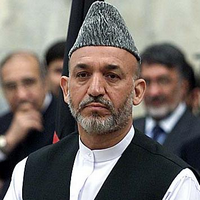
The Obama administration’s decision to begin a process of troop withdrawals from Afghanistan was predicated on the assumption that the U.S. and NATO mission in that country had successfully set it on a “glide path” toward an acceptable level of stability. While always acknowledging the fragility and reversibility of progress achieved to date, there was increasing confidence that, especially after the elimination of Osama bin Laden, the U.S. had turned a corner in Afghanistan. The assassination of Ahmed Wali Karzai, or AWK, throws all of this into doubt. Whether his killer in fact acted on orders of the Taliban, or […]
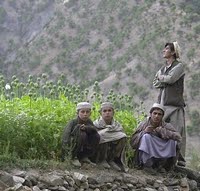
On June 26, at a gathering in Kabul marking World Counter Narcotics Day, the mood was somber. Gone was the positive spin of last year’s event, when Afghanistan’s minister of counternarcotics, Zarar Ahmad Moqbil, proudly announced that poppy cultivation had been reduced by up to 50 percent and that 23 out of 34 provinces were then free from poppy cultivation. Sadly, the significant decrease in opium production last year has since been attributed to a convergence of environmental and climatic variables that devastated the crops late in the season, not to effective counternarcotics measures. According to the United Nations, Afghanistan […]
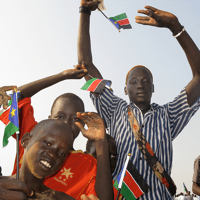
On Saturday, South Sudan achieved formal independence from the central Sudanese government in Khartoum. The event was cause for considerable celebration as well as several rounds of expressions of concern from observers in Africa and the West. While the status quo was untenable, the prospects for South Sudan look far from bright. It lacks both a well-defined border with its hostile mother-state and control over much of its own territory, and appears to have minimal administrative, military or normative capacity. In other words, it’s a disaster waiting to happen. The bleak scenario facing Juba raises the question: What have we […]
